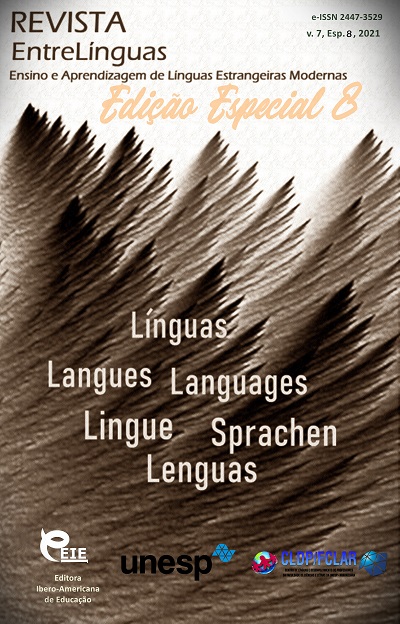The phenomenology of time in the poetic philosophy of A.I. Vvedensky
DOI :
https://doi.org/10.29051/el.v7iesp.8.16351Mots-clés :
Time, Moment, Insubstantiality, Consciousness, Coherency-incoherencyRésumé
For non-classical ontology, one of the major problems is time. It is through thinking about time and its relation to the essence of man, thought, or being that Kierkegaard, Bergson, and Heidegger attempted to construct a different ontology. The theme of time was also one of the main themes for the Russian poet and philosopher A. I. Vvedensky. The authors of the article suggest that on the basis of his poems and reflections conventionally united under the title "The Gray Notebook" the principles of a special phenomenology of time can be formulated; this work posits time as a quasi-ontological phenomenon that acts when we perceive and order reality through it, but it disappears when we try to observe and grasp it. Time cannot be a sequence or a counting measure. Thinking about time is a specific experience in which not only time itself disappears, but also the habitual reality measured and ordered by it, and something else opens up – a world outside of sequence and relation, outside of stable and limited relations and views. In this new world, the meditator himself dissolves and disappears crossing the border between time and eternity, the immanent and the transcendent, the human and the divine. Thus, Vvedensky's phenomenology of time is not a theoretical study but a practical turn, a change in the way of existence and, ultimately, an experience of salvation and freedom.
Téléchargements
Références
"...a company of friends abandoned to fate". L. Lipavsky, A. Vvedensky, Y. Druskin, D. Kharms, N. Oleynikov: "The Chinars" in texts, documents and research: in 2 vol. V.2 – Мoscow: "Ladomir" publ., 2000. – 749 p.
DRUSKIN, Y.S. (1999). Diaries. – St.Petersburg: "Academichesky proyekt", – 605 p.
Edmund Husserl. (1990). On the Phenomenology of the Consciousness of Internal Time (1893–1917) / trans. by Brough, J.B.: Dordrecht: Kluwer.
GIBIAN, G. (1971). Introduction: Daniil Kharms and Alexander Vvedensky. Russia's Lost Literature of the Absurd: A Literary Discovery: Selected Works of Daniil Kharms and Alexander Vvedensky. — Ithaca & London: Cornell University Press.
KERSTEN, F. (1982). Edmund Husserl. Ideas Pertaining to a Pure Phenomenology and to a Phenomenological Philosophy – First Book: General Introduction to a Pure Phenomenology. The Hague: Nijhoff.
LIPAVSKY, L., VVEDENSKY, A., DRUSKIN, Y., KHARMS, D., & OLEYNIKOV, N. (2000). A company of friends abandoned to fate. The Chinars" in texts, documents and research: in 2 vol. V.1 – Мoscow: "Ladomir" publ., – 846 p.
MILLNER-GULLAND, R. (1991). Beyond the Turning-Point: An Afterword. Daniil Kharms and the Poetics of the Absurd. — London.
STONE NAKHIMOVSKY, A. (1982). Laughter in the Void: An Introduction to the Writings of Daniil Kharms and Alexander Vvedenskij. Wiener Slawistischer Almanach. Sonderband 5. — Wien.
VVEDENSKY, A.I. (1993). Complete works in 2 vol.: V.1. Works of 1926-1937 - Мoscow: "Gilea" publ., – 285 p.
VVEDENSKY, A.I. (1993). Complete works in 2 vol.: V.2. Works of 1938-1941 - Мoscow: "Gilea" publ., – 271 p.
Téléchargements
Publiée
Comment citer
Numéro
Rubrique
Licence

Ce travail est disponible sous licence Creative Commons Attribution - Pas d’Utilisation Commerciale - Partage dans les Mêmes Conditions 4.0 International.
Os manuscritos aceitos e publicados são de propriedade da Revista EntreLínguas. Os artigos publicados e as referências citadas na Revista EntreLínguas são de inteira responsabilidade de seus autores.
Transferência de direitos autorais – autorização para publicação
Caso o artigo submetido seja aprovado para publicação, já fica acordado que o(s) autor(es) autoriza(m) a UNESP a reproduzi-lo e publicá-lo na EntreLínguas, entendendo-se os termos “reprodução” e “publicação” conforme definição respectivamente dos incisos VI e I do artigo 5° da Lei 9610/98. O artigo poderá ser acessado pela rede mundial de computadores (Internet), sendo permitidas, a título gratuito, a consulta e a reprodução de exemplar do artigo para uso próprio de quem a consulta, desde que haja a citação ao texto consultado. Essa autorização de publicação 328 EntreLínguas, Araraquara, v. 1, n .2, p. 323-328, jul./dez. 2015 não tem limitação de tempo, ficando a UNESP responsável pela manutenção da identificação do(s) autor(es) do artigo. Os artigos publicados e as referências citadas na Revista EntreLínguas são de inteira responsabilidade de seus autores.











